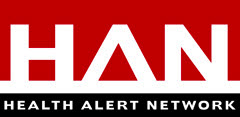
Tuesday, March 16, 2004, 11:43 EST (11:43 AM EST)
CDCHAN-00189-2004-03-16-ADV-N
Public Health Precautions Related to Mass Trauma
Based on recent events in Spain and Pakistan, clinicians, hospitals, and public health agencies should ensure that they are prepared to respond to mass trauma related to terrorist bombings. On March 11, 2004, bombs detonated on commuter trains in Madrid, Spain, killing more than 200 people. On Monday, March 15, 2004, police successfully disarmed bombs in a van outside the U.S. Consulate in Karachi, Pakistan. These events raise concerns about the potential for similar attacks that may result in mass trauma in the United States.
Mass trauma is defined as the injuries, death, disability, and emotional stress caused by a catastrophic event, such as a large-scale natural disaster or a terrorist attack. In the event of mass trauma, clinicians, hospitals, and public health agencies should be prepared to treat injuries, disability, and psychosocial (individual and community) stress. Clinicians, hospitals, and public health agencies need to also be prepared for a large number of fatalities.
Public health and medical care systems (including physical and mental health, public information, and social services) are encouraged to develop and review protocols for the treatment of mass trauma. They are also encouraged to develop and review hospital plans for dealing with surges in demand for emergency care due to complex injuries, psychosocial distress reactions, and the acute aggravation of chronic diseases that may be triggered by the psychological terror of such events.
Information on injuries and stress related to mass trauma can be found on the CDC Mass Trauma website at http://www.cdc.gov/masstrauma/default.htm. This site is designed to provide information and preparedness and response tools to help public health professionals and clinicians prepare for and respond to mass trauma events. The website also contains fact sheets in English and Spanish for the public. Additional information resources and descriptions of relevant research studies can also be found on the site.
Fact Sheets for Public Health Professionals and Clinicians
· Brain Injuries and Mass Trauma Events
· Lesiones cerebrales y sucesos traumáticos masivos
· Coping with a Traumatic Event
· Cómo manejar un suceso traumático
· Injuries and Mass Trauma Events
· Lesiones y sucesos traumáticos masivos
Preparedness Tools for Public Health Professionals and Clinicians
· Explosions and Blast Injuries: A Primer for Clinicians
· Mass Trauma Casualty Predictor
· Predicting Casualty Severity and Hospital Capacity
Response Tools for Public Health Professionals and Clinicians
· Mental Health Survey Instrument
· Rapid Assessment of Injuries from Mass Trauma Events
· Rapid Assessment of Mental Health (Mental Health/Crisis Intake Form)
Resources for Public Health Professionals and Clinicians
· Medlineplus Health Information Website--Disasters and Emergency Preparedness
· Preparing for the Psychological Consequences of Terrorism: A Public Health Strategy
· State and Local Health Department Websites
Fact sheets in English and Spanish for the Public
· Brain Injuries and Mass Trauma Events
· Lesiones cerebrales y sucesos traumáticos masivos
· Burns
· Coping with a Traumatic Event
· Cómo manejar un suceso traumático
· Injuries and Mass Trauma Events
· Lesiones y sucesos traumáticos masivos
Additional information on psychosocial stress as a result of a
catastrophic event can be found at:
Government Agencies
Federal Emergency Management Agency (FEMA): www.fema.org
National Institute of Mental Health (NIMH): www.nimh.nih.gov
Substance Abuse and Mental Health Services Administration (SAMHSA): www.samhsa.gov
U.S. Department of Homeland Security Website: www.dhs.gov
Non-profit Organizations
American Counseling Association: www.counseling.org
American Psychiatric Association: www.psych.org
American Red Cross: www.redcross.org
Disaster Mental Health Institute, University of South Dakota: www.usd.edu/dmhi
National Center for Child Traumatic Stress: www.nctsnet.org
National Mental Health Association (NMHA): www.nhma.org
HAN Message Types
- Health Alert: Conveys the highest level of importance; warrants immediate action or attention. Example: HAN00001
- Health Advisory: Provides important information for a specific incident or situation; may not require immediate action. Example: HAN00316
- Health Update: Provides updated information regarding an incident or situation; unlikely to require immediate action. Example: HAN00309
- Info Service: Provides general information that is not necessarily considered to be of an emergent nature. Example: HAN00319
## This Message was distributed to State and Local Health Officers, Public Information Officers, Epidemiologists and HAN Coordinators as well as Clinician organizations ##
You have received this message based upon the information contained within our emergency notification database. If you have a different or additional e-mail or fax address that you would like us to use, please contact your State-based Health Alert Network program at your State or local health department.
- Content source: CDC Emergency Risk Communication Branch (ERCB), Division of Emergency Operations (DEO), Office of Public Health Preparedness and Response (OPHPR)
Get email updates
To receive email updates about this page, enter your email address:
Contact Us:
- Centers for Disease Control and Prevention
1600 Clifton Rd
Atlanta, GA 30333 - 800-CDC-INFO
(800-232-4636)
TTY: (888) 232-6348 - Contact CDC-INFO


